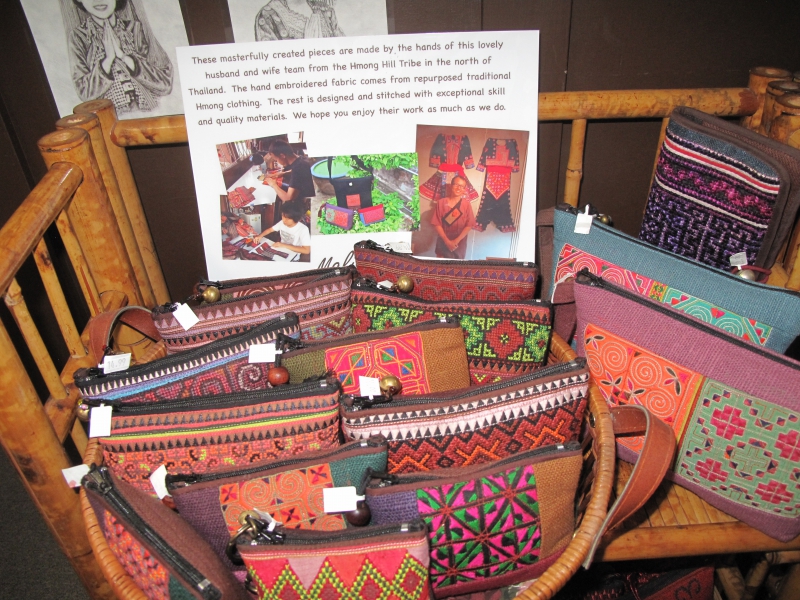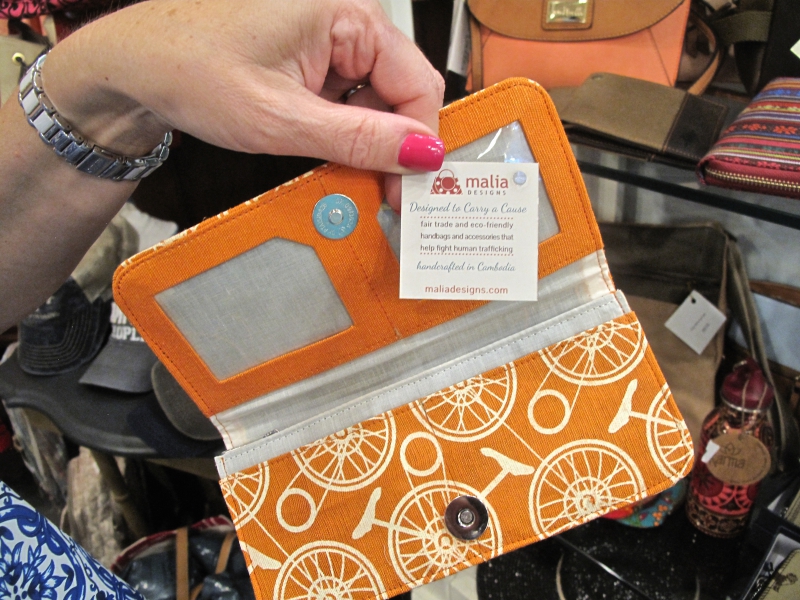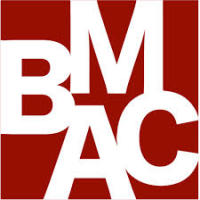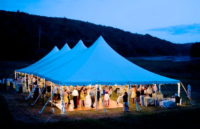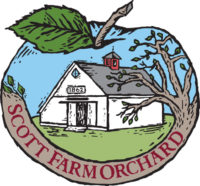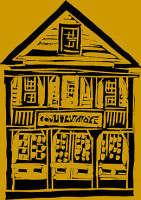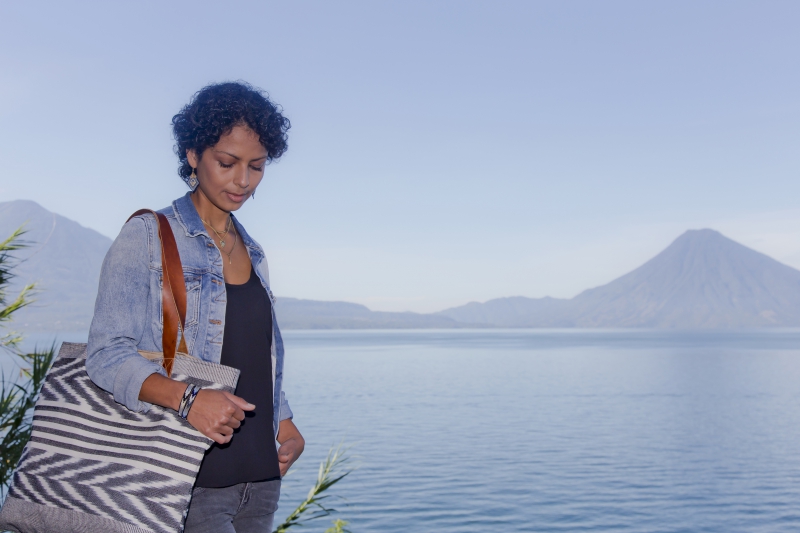
All of Altiplano brand products are handcrafted in the highlands (Altiplano) of Guatemala. Based on the beautiful shores of Lake Atitlan, beneath the towering volcanoes, Altiplano has been providing fair wage and employment for over 20 years.
By Nicole Colson
When we give businesses our patronage—in, say, grabbing a cup of coffee on the way to work, looking for a special gift, or picking out home decor—most of us probably don’t give much thought to the stories behind the products we buy. It might surprise us to learn that several downtown Brattleboro retailers help populations around the world land an education, feed their families, and make a decent wage for a better quality of life.
At the same time, these business owners are working to build relationships with far-flung communities to help preserve indigenous lifestyles.
It turns out that importing traditional handcrafts and working with the makers to produce styles and colors for the American market rings in as a resounding win for the purchaser, the maker, and the business. Here are five local companies we’re particularly proud to share the world with…
Altiplano: Fair trade and gorgeous goods
When Shari Zarin and her husband, John von Wodtke, traveled to Guatemala for the first time 25 years ago, they couldn’t have imagined where their trip would lead. In fact, the country’s Lake Atitlán was one of several locations they visited on their journey through Central and South America.
“It caught our attention,” says Zarin. “Both the people and landscape are majestically beautiful, and their world-class traditional dress and weaving are alluring.”
On returning home to Vermont, the couple began selling the crafts that they’d picked up there. They also made plans to return, and made the trip several times before embarking on a serious path. The couple became pioneers in the “fair trade” movement, in which fair prices are paid to producers in developing countries.
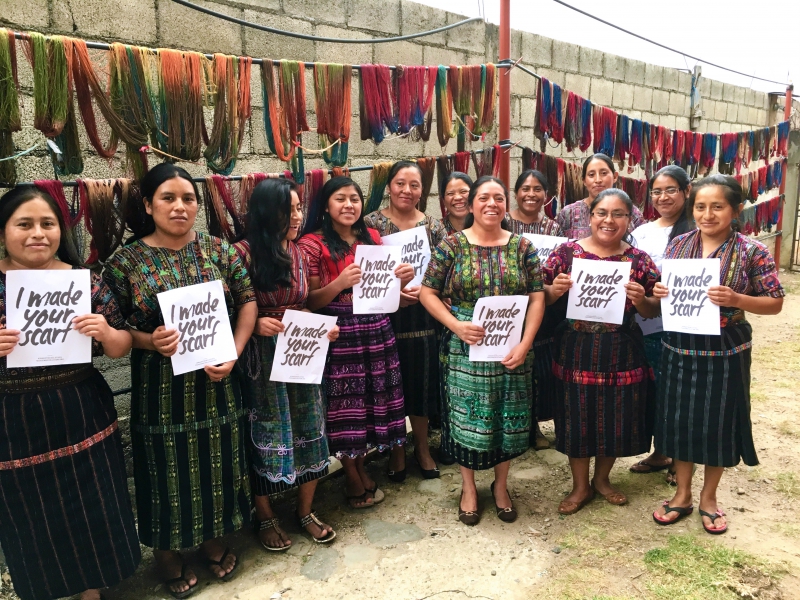
This photo was taken as a part of Altiplano’s participation in “The Fashion Revolution” an ongoing international movement promoting ethical fashion.
The couple began to design products and to live part of the year in Guatemala. They raised three children both there and in Vermont.
Altiplano, named for the Guatemalan highlands—also a nod to taking the high road in business—is a brick-and-mortar boutique on Elliott Street in Brattleboro, as well as a wholesale and retail online business. The shop offers Zarin’s jewelry and bags among an assortment of contemporary women’s clothing, toys, stationery, accessories, and decor.
The couple opened the store nearly 13 years ago, after wholesaling their wares for more than two decades. Most of the business is wholesale.
“We sell to a variety of catalogs and boutiques across the country, in Europe, and Australia,” Zarin tells us.
She and von Wodtke visit Guatemala twice a year for five weeks at a time to develop new collections: spring and summer and fall and winter. There, they work with many cooperative groups, small family businesses, and their own fair trade workshop. Their work in Guatemala has been to take the traditional craft and skill set and make it marketable in the States.
Of the villagers, Zarin says, making products for the Western market is a challenge. Her most valuable contribution is in the design process: taking what the villagers do so well and making it something they can live on.
The most impressive traditional craft in Guatemala is handwoven fabric. Zarin “upcycles” traditional textiles such as huipil—a loose-fitting tunic with heavily decorated designs woven in—into bags and accessories.
“Every village has its own traditional dress, which is fascinating,” Zarin reports. “Although the time-consuming tradition is seeing a general decline and is feared to soon be lost, in the village where we do our bead work I see the women empowered by employment. In return, their traditional dress has become more elaborate than ever. It makes me happy to see these women take so much pride and investing in their traditional dress.”
One of Altiplano’s most successful projects is its long-term partnership with a cooperative group of women working on backstrap looms. The group uses traditional dying and weaving techniques to create incredible ikat scarves made of organic bamboo.
“They feel and look as wonderful as the project itself,” Zarin says. “The group began 30 years ago this year, in response to the war and loss of village men. It left a lot of women to provide for their families.”
The cooperative employs well over 100 weavers.
In addition to her work with textiles, Zarin designs all of the jewelry she sells. It’s manufactured in two workshops in Guatemala: one works with metals, and the other in beads. Traditional wood-carved Nativity scenes and saints are also manufactured there.
Zarin says she and von Wodtke are committed to Guatemala, and often reflect on their work and purpose and how they are making a difference.
“Our charitable giving focuses on supporting Guatemala’s women, children, and the environment, but I think our greatest gift has been our long-term fair wage employment,” she says.
Indicating a photograph on her desk of her production manager and her young daughter taken 20 years ago, she says, “That girl is now a mother herself and one of my valued employees. The impact on these people’s lives is measurable. They count on us.”
What Zarin reflects on most is the number of hands touching everything the company makes.
“There are so many people putting their mark on it,” she says. “We have a great team, both in Guatemala and here in Vermont. It’s a joy to know our little piece in the world provides a living for so many. It’s incredible.”
Mocha Joe’s Roasting Co.: Coffee to the rescue
Pierre Capy was working as an interior landscaper when he stopped at a famous Cambridge, Massachusetts café. He was immediately inspired to embark on a new career roasting, grinding, and serving his own coffee.
For its first couple of years, Mocha Joe’s, on Brattleboro’s Main Street, carried Fair Trade-certified coffees from various locales until an employee from Cameroon, also a student at the School for International Training, suggested Capy develop his own.
Today, Mocha Joe’s operates a mill in Cameroon backed by four full-time employees there.
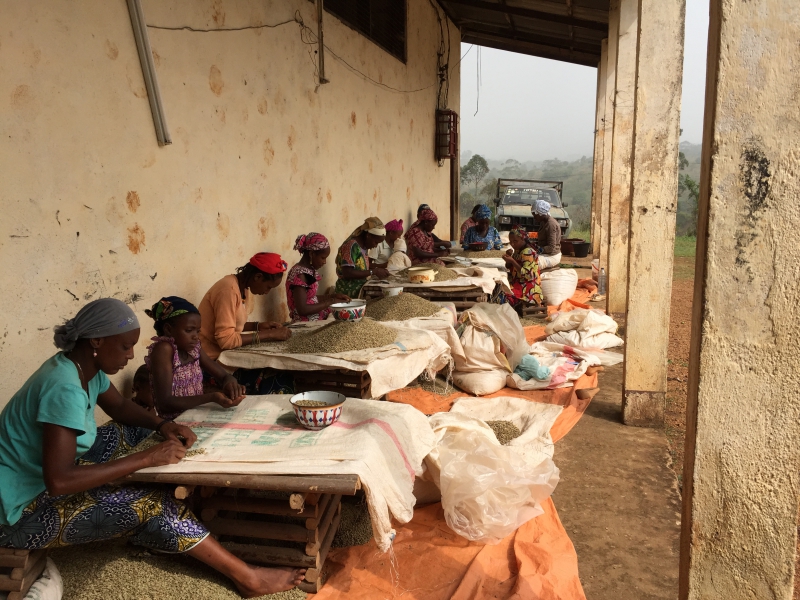
Workers in Cameroon sort fair-trade coffee beans for the Brattleboro-based coffee roaster Mocha Joe’s.
They started bringing in coffee from Cameroon in 2009 but the quality wasn’t yet up to par. According to coffee consultant Jacqueline Billings, who has worked for Mocha Joe’s for 10 years, the team went back every year and made more coffee and more suggestions.
“And it got better,” she said.
The fruits of a three-year process: Mocha Joe’s started importing certified organic coffee from Cameroon two years ago. The company recently brought in a 19-ton container brimming with goodness, up from an initial two tons.
Capy visits Cameroon—two villages, Mbessa and Oku—three weeks a year, where Capy works on milling, processing, and sorting. Employees handle purchasing, organizing workshops for farmers on organic growing methods, and harvest support.
“You come to the café and drink something that’s a connection between Brattleboro and Oku,” Billings said. “We, our farmers, and our customers create it together. It’s exciting.”
The company pays its 100 sorters three times the salary sorters are paid for commercial coffee. It also provides daily meals for them, and pays hospital expenses and family death benefits.
“The way we’re purchasing coffee has a positive impact, if not on the coffee industry as a whole then for people on an individual level,” Billings said.
Mocha Joe’s also improves the lives of the people of Cameroon through an interest-free microloan program for farmers and sorters.
“Coffee buyers normally say, ’I’ll give you money now, but you need to give me this much of your future harvest in exchange,’” Billings explained.
“It’s not a favorable exchange. We do a similar thing where we give coffee growers loans in exchange for coffee but we negotiate a price at the time the coffee is sold to us based on current market prices instead of the inflated interest rates and prices that don’t reflect the market. It’s changed economics for coffee growers.”
Loans the company has provided nurtured a small retail business and an organic coffee seedling business.
Mocha Joe’s also lends money to many of its farmers to float them through the lean season.
And because the trees the farmers are cultivating are old and low-producing, Mocha Joe’s operates a nursery in Cameroon to provide farmers disease-resistant trees for higher yields.
The company also purchases conventional (non-organic) coffee from Cameroon and from other farmers in the region to introduce them to their organics program.
They pay a third more than other local buyers for it, Billings said.
A new effort this year is the purchase of “micro-lots” of coffee: small amounts of coffees from single farms. For that, the company pays an organic premium.
Business is good. The company expanded further into Guatemala two years ago, working with a coffee farmer on land that mining had decimated.
“It took 15 years for the land to be able to cultivate,” Billings said. “We work with the farmer on improving harvesting and processing techniques and we mill it ourselves. We buy his entire production whatever the result.”
Billings said the company has already seen big improvements over 2016.
Meanwhile, Mocha Joe’s is looking to expand coffee growing operations in more locations. Part of the engine of this success: Purchasing coffee this way saves money.
“People say being socially responsible is so expensive. We’ve found that not to be true,” Billings explained.
Typically, a commercial roaster practicing direct trade can visit a mill, taste several coffees, and choose to buy from that batch.
“With us it’s more about the relationship and building the coffee we want by helping under-resourced farmers develop higher-quality coffee,” Billing said. “It’s about making a commitment to be there every year. When you build trust, you create something amazing together.”
A Candle in the Night: Covering a world of wonder
A Candle in the Night, a home furnishings and Oriental rug store, has been selling hand-woven rugs since it opened in downtown Brattleboro more than 40 years ago.
Wandering the globe in the early 1970s, co-founder Larry Simons developed a deep appreciation for handcrafted textiles and the weavers who created them. He began collecting rugs and textiles and in 1973 opened A Candle in the Night. In 1975, his wife, Donna, joined the business, adding furniture to the eclectic mix.

According to Donna Simons, the rugs in Candle in the Night “are made by Habibulah in Afghanistan by Turkmen weavers using handspun wool and natural dyes, in traditional Turkmen designs. I sell as many of these rugs as I can and have been since the production began. Larry and I went to Pakistan in the late 1990s when the Afghan Turkmen people were living in refugee camps in Northern Pakistan. We visited the schools and traveled to the various wool dying, weaving, and finishing workshops.”
In the early 1980s Simons met Chris Walter, who had been importing Oriental rugs from the weaving countries of Asia. They became friends and developed a lasting business relationship.
“Chris was traveling the world and was in the rug market in Islamabad, Pakistan,” Larry Simons told us. “He met two Turkmen cousins selling rugs and began a conversation about the state of weaving in Afghanistan and the difficulty for the Turkmen people who were rug weavers.”
Walter bought rugs from them to sell, and by the early 1980s one of the cousins—Habibullah Karimi, an Afghan refugee then living in Pakistan—and Walter began making rugs in the Afghan refugee camps in Northern Pakistan. The two formed what would become Barakat, which reinvests profits back into the communities where they have been working, to promote education: particularly for girls and women.
Barakat originally wanted to open its first school in Afghanistan, but the Soviet withdrawal and subsequent Afghan Civil War left the country in too much turmoil to make this possible.
Instead, Walter and Karimi turned their efforts to Attock, in northern Pakistan, where a large number of Afghan refugees had settled, and began work on the first of what became three schools Barakat has in the country.
With the Taliban finally overthrown, Barakat moved into Afghanistan, where it operates its schools and home-based literacy programs for girls and women who cannot attend formal school. Barakat Inc. was registered as a U.S. nonprofit in 2000.
Today, Barakat has grown into an organization spread across two countries, serving more than 3,000 women and children each year.
“Barakat Afghanistan and Barakat Pakistan work toward our mission by employing entirely native staff and teachers who represent the student community and providing exemplary basic education in Afghanistan and Pakistan at no cost to the students,” Walter said.
“Donna and I went to those schools in Attock and met the teachers,” Simons said. “I admire Chris Walter’s dedication to helping the Turkmen weaving families. It’s very satisfying to sell rugs that support Barakat.”
Donna Simons is not as optimistic about the future of traditional handcrafts.
“People used to care about the authenticity and culture behind the weaving,” she said. “I think the younger generation is more price-conscious and trendy.”
She added, however, that the rugs being woven today are among her favorite: “The colors are so rich and beautiful, the quality of materials is superior, and the fact that it supports Barakat is humbling.”
Malisun: Vermont flows with Hmong handiwork
In addition to selling her own hand-crafted jewelry at Malisun, her Harmony Place boutique, owner Kim Murray carries clothing from her native Thailand.
Needing help increasing her clothing inventory when she opened her store, she enlisted the aid of about a dozen designers from villages in northern and central Thailand.
That was 10 years ago. And it was a plan that worked, bridging two very different worlds.
“People wear bright colors in Thailand because it’s very hot,” she tells us. “No one wears those colors in Vermont.”
These days, she visits her home country once a year and provides her input so designers can make these adjustments on-site. The result is a flowy, bohemian collection of tops, pants, skirts, and dresses.
“They do good quality of work and I like that there’s no middleman,” she says.
The clothing is made by the hands of a people from the Hmong hill tribe. The Hmong migrated more than 100 years ago from the southern part of China into Thailand, Laos, Myanmar, and Vietnam.
It pleases Murray to know her work is helping to advance a way of life and helping people provide for their families.
“The designers’ faces come to mind when I look at my clothing,” she says.
The B’s Nest for responsible home goods
Sisters Brenda Knock and Beverly Buccheri carry products that come from all over the world—including right in town—at their three-year-old home goods store on Elliot Street.
A great many of those products come from socially and ecologically conscious companies, which is one reason the sisters support them.
Among the suppliers are Chavez for Charity, which sells stone- and glass-beaded bracelets that are the cornerstone for their trademark concept, Colors for Causes. Each of the 10 colors in the collection represents a cause. With each sale, the company donates 25 percent of profits to the corresponding charity, from those that bring clean water and sanitation to rural and impoverished communities to those that provide education for children lacking quality schools.
B’s Nest also carries wallets by Malia Designs, which rose to increase economic opportunities for women in Cambodia and to support organizations that fight human trafficking in Southeast Asia. The company’s products are made by Fair Trade producer groups that employ disadvantaged people in Cambodia and bring their crafts to Western markets, which expands their access to sustainable income.
Flip-flops and bracelets from the company Bops grace the store’s shelves. Bops directs a portion of its profits to efforts in teaching practical skills to women to start and sustain businesses of their own. The company works in India, Guatemala, China and the United States, selling jewelry, clothing, accessories, and gifts.
Its sewing program in India, for example, has helped more than 200 women graduate —products the company sells are made by these graduates—and gives them a sewing machine to start their own business.
Knock and Buccheri attend trade shows, where they learn more about these responsible companies. They said they plan to carry more Fair Trade products.


